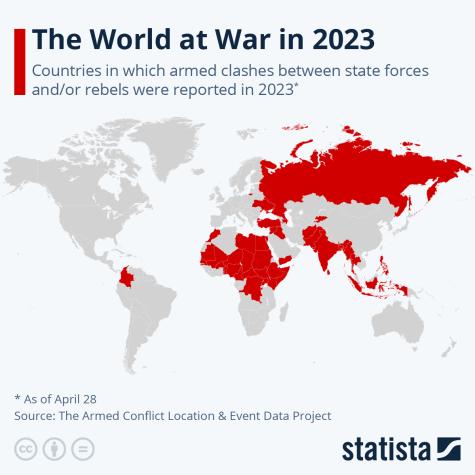Common Security

➡️ COMMON SECURITY - Cooperation & Shared Responsibility for Mutual Safety
In the words of SIPRI, "no country can obtain security, in the long run, simply by taking unilateral decisions about its own military deployment."
The concept of common security redefines traditional approaches to achieving safety by moving away from confrontation to collaboration. The idea urges nations to work together to address global threats through trust, mutual understanding, and dialogue. The focus is shifted from militarisation and vengeance to peace and justice.
Security is about building a future where security is collective, not competitive. Common security creates a safer and more stable world, where resources are directed towards development rather than defence.
Jump straight to our resources on ➡️ Common Security
Explore our comprehensive guides on -
- Peace & Disarmament
- Olof Palme
- The United Nations
- Conflict Resolution, Nonviolence & Neutrality
- International Day for Dialogue Among Civilisations
- Fostering a Culture of Peace
- International Day of Peace
- The Doomsday Clock & Nuclear Disarmament
Common Security according to Olof Palme
Olof Palme's vision of Common Security was revolutionary. He believed that exerting military might is not a viable way to achieve sustainable peace. Palme argued that true security is shared, not imposed, and that it must be built on trust and cooperation.
His approach calls for disarmament, economic collaboration, and respect for human rights. By focusing on these principles, creating stability and prosperity for everyone is a real possibility. By avoiding violent confrontation, we can save thousands from needless death, destruction and suffering - the inevitable consequences of endless wars.
"International Security must rest on a commitment to joint survival rather than a threat of mutual destruction." - Olof Palme

History of Common Security
The United Nations was founded in 1945 with the intention of promoting international peace and security through collective action, placing greater emphasis on diplomacy, conducting peacekeeping operations, and ensuring that international laws are adhered to. This was the first time the idea of a collaborative effort towards peace was attempted. The UN Charter preamble was a declaration by member states to end war and aid international cooperation and tolerance.
In 1969 Willy Brant, the Federal Chancellor of Germany proposed a policy of détente to ease tensions with Eastern Europe and Soviet bloc countries. His belief was that constructive engagement would lead to improved international relations, freedoms and a lasting peace. Brant often collaborated with Palme on global issues. It was the beginning of a more collective approach to tackling wider regional problems.
The Organisation for Security and Cooperation in Europe (OSCE) was established three decades later, in 1979 and offers a broader approach to security for Europe than traditional military-focused strategies. Their founding principle of comprehensive security recognises the importance of integrated solutions which respect human rights, democracy, the rule of law, and economic and environmental issues.
The concept of Common Security finally emerged during the Cold War, a period of intense geopolitical tensions that left the world teetering on the brink of nuclear disaster. It was a visionary approach aimed at redefining international relations, emphasising cooperation over confrontation. The idea gained prominence in the early 1980s, largely through the work of the Independent Commission on Disarmament and Security Issues, chaired by Swedish Prime Minister Olof Palme.
In 1982, the Commission presented a report that first coined the term "Common Security." Its focus was on the concept that nations can only feel safe when their counterparts feel safe. Safety cannot be at the expense of others. Shortly after, SIPRI held a conference to examine the idea and explore ways to implement common security in arms control policies and disarmament.
In 1990, the Charter of Paris for a New Europe was adopted by most European states, Canada, the U.S., and the former Soviet Union. It declared the end of Cold War divisions within Europe and established a framework for democracy, cooperation, and equal security. It laid the groundwork for transforming the OSCE into what it is today. The summit was labelled the peace conference of the Cold War.
Common security policies have so far failed to be fully embraced. Obstacles such as national sovereignty, rearmament drives, supranational forces, and the perceived threat of hostile states continue to fuel military-first approaches.

How to Achieve Common Security
With the world facing unprecedented global issues, nations must start working together to address these shared threats. Common security advocates for disarmament, dialogue, and the strengthening of international institutions to resolve conflicts and solve issues peacefully.
Humanity is currently facing the existential threats of nuclear war, climate change and global pandemics. The world is currently experiencing the highest number of conflicts since 1945. These threats are exacerbated by inequalities, polarisation, nationalism, democratic backsliding, and increasing repression of populations.
Common security can be used to tackle not only security issues but also contemporary risks, which require a global collective effort. When applied to other risks, enduring peace becomes the by-product of sustainable economic development, a commitment to human rights, and environmental responsibility. It underscores the interconnectedness of global issues and reminds us that collaboration, rather than competition, is the most effective way to address such large-scale problems.
To achieve common security, we must -
- Curb military spending (world military expenditure reached a whopping $2718 billion in 2024!) and redirect these funds into health, education, social welfare and climate action.
- Ratification and implementation of the Treaty on the Prohibition of Nuclear Weapons (TPNW) by all nations.
- Stronger international regulation of emerging autonomous weapons (killer robots).
- Ensure a just transition of workers from the military-industrial complex to green and social sectors.
The further we move away from common security, the further we get from tackling the most significant risks to our planet and society. Countries are siphoning record funds into their militaries and deepening their ties to the arms trade. Instability is rising, and citizens are becoming less safe.
In the words of Olof Palme, "In a world of conflicts, dialogue is the language of peace".
Author: Rachael Mellor, 10.09.25 licensed under CC BY-SA 4.0
For further reading on Common Security see below ⬇️
- Common Security 2025 Conference - Redefining security for the 21st Century - ITU 4/25472247
- COMMON SECURITY 2022 REPORT - For Our Shared Future (must read)472230
- Common Security Report 2022 – For Our Shared Future - IPB472229
- Common Security 2022 / Palme Report - en, fr, es, de, ru, ch472231
- Video: Common Security 2022 (short introduction)472232
- Common Security Report 2022 - full report in English *.pdf472242
- Common Security Report 2022 - full report in English *.pdf - IPB472233
- Campaign for Peace, Disarmament and Common Security - CPDCS472241
- Video Channel - Campaign for Peace, Disarmament & Common Security472240
- Common Security: A System of Global Interdependence - Global Security 476223
- Google Scholar472234
- Google News472235
- YouTube Search472236
- #CommonSecurity472250
- Sustainable Common Security472256
- Common Security - Unfold Zero472252
- Common Security Concepts - alooba472253
- Human Security and Common Security to Build Peace - IPU472261
- BOOK: A Global Security System: An Alternative to War - AGSS by WBW 2023472259
- BOOK: Policies for Common Security - SIPRI 1985472251
- A New Proposal to Revive the 1961 Mccloy-Zorin Plan as a Basis for Collective Security - Friedensnews 06.06.25473435
- China Calls for Global Nuclear Disarmament: ‘Common Security First!’ 5/25472260
- The EU Common Security and Defense Policy: Moving Away From Democracy Support - Carnegie 3/25472245
- Video: The Threat of Nuclear War & Common Security - Prof Wolfgang Hofkirchner (GSIS) 12/24472249
- Video: Common Security, The New Agenda for Peace, and the Pact for the Future: Redefining Security - IPB 9/24472254
- A United Nations Emergency Peace Service 12/23 *.pdf472257
- Video: Final Panel: Rethinking Common Security –On the Future of the European Security Order 10/23472248
- The imperative of Common Security in a competitive international security system - FES 3/23472255
- Video: Common Security Report 2022: UK launch - CND 7/22472237
- Video: Peace Summit: What kind of security architecture for Europe? Common Security Report 2022 - 6/22472243
- Can we build “common security” as an alternative to war? - PeaceQuest 5/22472244
- Common Security 2022: Global civil society leaders set out path to peaceful progress - ITUC 4/22472262
- Video: Interview with Philip Jennings and Sean Conner on the launch of the Common Security Report 2022 - IPB 4/22472238
- Video: International & North American Launch of 21st Century Common Security Report 2022 - 4/22472239
- Video: Common Security 2022: Peace and Climate Change - Olof Palmes Internatıonal Center 19.10.21473440
- Videos: Common Security: A System of Global Interdependence - WBW 10/17472258